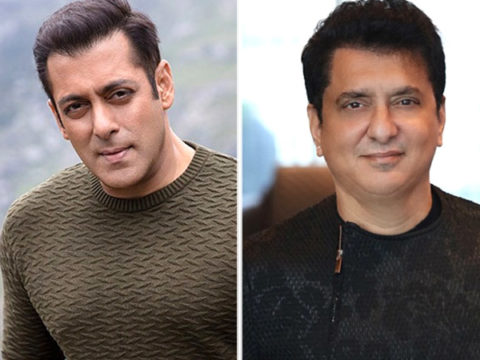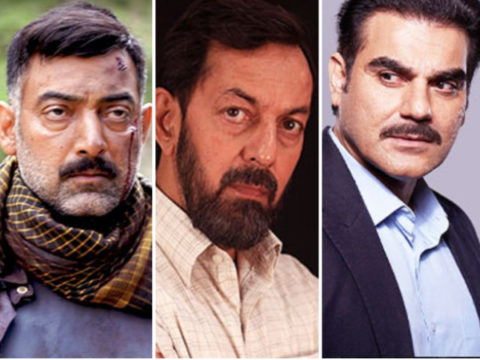
When I walked into a room at the Queen Elizabeth 2 hotel slash yacht, there was a silence. Almost reverential. Dubai audiences are like that. They are respectful and not at all disruptive. I was running late and surreptitiously sat in a corner chair settling in, uncomfortably aware of my own tardiness. I looked up and watched a young lanky man take deliberate sips of water staring straight ahead outside the window where a hot sun gleamed at the sea. Ahead of the quietly listening audience was Varun Grover who was delivering a screenwriting workshop, telling the story of how to tell a story.
Grover is a stand-up comic, political satirist, dialogue and screenwriter and his journey is a big lesson on how to find and carve your own space in an industry that has a set formula and corporate giants dictating that formula. Starting from smaller films, Grover is now behind Sacred Games, the Netflix hit show starring Saif Ali Khan and Nawazuddin Siddiqui. Grover’s credits also include Dum Laga Ke Haisha, and Masaan, among other critically acclaimed feature films. His stand-up comic routines have gone viral in a big way and Grover doesn’t take any prisoners. He says what he wants and when he wants it.
Someone in the audience asked him about his success. “For this, you have to understand privilege,” said Varun with his standard serious expression. “I was born in a home where we could afford to watch films every month or so. We lived in a rented house but we never had to worry about the things a lot of people have to: school fees, stuff like that. I was an upper caste Hindu male born in North India.” There was a small ripple of laughter. You could always trust him to tell it like it is.
“You have to read so much, know so much about stories and how stories are told that you should, at one point, be puking stories,” Varun tells his rapt audience. “You can start thinking about water. And you can begin thinking about the story of water. There’s so much to delve into – only if you are deeply interested in how water is created and what is its function in the world.” The workshop went on for a while. A lively QnA session followed. When I sat with Varun after he was done taking selfies with his fans, I told him I admired his work and most of all, his bravery. But my first question was about any story, any one in particular, that had stayed with him.
“There are many stories like that,” Varun replies. “They haven’t been written yet. There are drafts that I have scripted but they haven’t really come out the way that I want them to and haven’t been shown the way I wanted them to. Some day I will get around to doing them.”
Varun was in Dubai for a standup show and I asked him about the difference between comedy and screenwriting. “Comedy disappears moment that I say it,” Varun answers. “You can’t tape it, it’s not the same energy as screenwriting. In comedy, for example, you will see something on a Netflix special and you won’t feel the same joy you will see which you get it when you see it live. Screenwriting is specifically for screen, it’s got so many people chipping in with their interpretation. Its fun and I like it – it allows me to reach out to people in a different format, in a story format. There’s also more scope for experimentation, from comedy to thriller to arty to filmy. It has more posterity too.”
Varun had appeared earlier in a festival for Urdu and had spoken about the love of languages. Were there any particular writers in Urdu that he has liked? After a pause, Varun said, “Manto. I’ve always wanted to do something around him but stuff has been made on him in India and in Pakistan. Maybe I could find out if they’ve done something on him in Bangladesh? I could maybe go and ask if they’ve done something on Manto. (laughs) I’m very fascinated by the life of Jaun Elia. I love his work. I think after Ghalib if there has been great poet it was Majaz and then there is Jaun Elia. There were a lot of ups and downs in Elia’s life and how he struggled existentially. Urdu is such a rich language and we haven’t been able to read a lot of Urdu in Hindustan. We understand Urdu but we haven’t been able to read as much. We have a lot to discover.”
Elia was a creative soul and so is Varun. Earlier there was a research that suggested that there is a credible link between creativity and mental illness. Would Varun agree? “It’s a correlation/coincidence which people call as causation,” Varun replies. “People read about it and think hey that just might be true. There are many great artists who have been mentally healthy and there are many artists who have been struggling mentally. It is a bit unfair and a big burden for people who are going through mental health issues.”
I thanked him for his time and he went back to rest for his show. His casual charm and deadpan humor is probably why people love his standups and his writing. Sacred Games 2 is out now and meeting with mixed reactions but hey. Could never please them all, could you? For more of this, check out the live session of Varun Grover with Masala UAE here.
Credit: Source link














